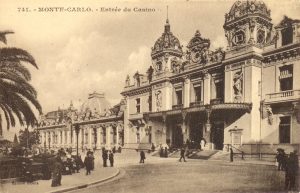
Charles Deville Wells broke the bank several times in 1891.
Having arrived back in Monte Carlo a few days earlier [see recent blog posts], Charles Deville Wells had gone on to win yet another fortune at the gaming tables. By 7 November, 1891, public interest in his exploits had reached fever pitch. The Times and The Daily Telegraph each sent a journalist out to Monaco to watch him gamble. This was the first time that London-based reporters had been in a position to give a first-hand account of Wells’ activities. It was also the occasion when he gave his first-ever ‘press conference’, with the two newspaper men hanging on to his every word.
In The Man who Broke the Bank at Monte Carlo, I include some short extracts from this coverage, but here, in its entirety, is the Telegraph article dated 8 November – the day after the interview – and printed in the following day’s edition.
Mr. Wells, the lucky Englishman, closed his campaign against the Monte Carlo gambling tables last night, and left for England, the winner of £28,000. This, added to the £32,000 won in July, makes a sum total of £60,000 winnings [equivalent to £6 million today]. On Friday last he cleared £10,000, and broke the bank five times in the evening. He had before him a pile of thousand-franc notes a foot and a half high, but he never lost his head at play, and afterwards slept soundly with them under his pillow in a room at the Hotel de Paris, overlooking the Place du Casino.

The Casino viewed from the Hotel de Paris. Charles Wells crossed the square (right foreground) to the hotel, staggering under the weight of a million francs in banknotes, and slept with them under his pillow.
I had a long talk with Mr. Wells last night when he rose from the gambling-table, and asked him for the secret of his success. He replied that this was the result of a system of his own, which he had been working out for years, and after patiently watching the behaviour of the table. He was now putting it into actual practice. He thought its value had been fully tested during its trials of the past week and of July last. [See blog posts ‘On this day 125 years ago’, 28 July – 3 August, 2016] I then remarked: ‘If this system be infallible, why not go on and clear out the bank?’ ‘Because,’ replied Mr. Wells, ‘the physical strain is beyond my strength. I have been sitting daily from twelve noon till eleven at night, playing without a break, and I am worn out. But I have decided to come again shortly. I have implicit faith in my system, and I am perfectly sure I can win again.’*
I then asked Mr. Wells if he cared to give to the world in general and players in particular the advantages of his system, but he declined. Players, he said, had watched him and tried to do likewise, but the great majority had not pluck enough to follow him even when they saw him winning. His system required £6,000 capital,** as it must for the most part be played with the maximum stakes of 6,000 and 12,000 francs, so as to enable the player to withstand a considerable run of adverse luck. He acknowledged that one of his principal points was to follow the table, and catch ‘runs’ or ‘series’ as on Thursday and Friday, when with 12,000 francs on each of the two chances he was able to clear the table of its capital several times. Again, at one o’ clock yesterday, he had taken all of the 100 and the 1,000 franc banknotes supplied to the trente-et-quarante table, and the croupiers were obliged to pay one deal in small odd notes and rolls of gold*** until another £4,000 had been brought by the cashier.
All this naturally afforded splendid sport for the spectators, who rejoiced at so successful an attack upon the enemy. Mr. Wells added that when the cards were running awkwardly he placed smaller stakes, but for ‘series’ he placed the maximum of 12,000f on each of his chances. He always insured against a ‘refait’ (the bank’s odd chance); and though this cost him at the rate of 1 per cent. upon his stakes — over £1,000 a day — he believed it paid him. Then he never tempted good Dame Fortune too far, and sent off his winnings to London daily, and left when his luck turned. That, he admitted, was a great help even to this system of his, and finding yesterday that he was making no progress, he packed up his portmanteau.
(Daily Telegraph, 9 November 1891, p.5)
NOTES:
* Wells did in fact return two months later, in January 1892. I’ll be recalling the events of that visit 125 years on.
** £6,000 was the sum which he wanted investors to provide in return for “Thirty thousand pounds a month”. (See my blog post of 2 November, in which his actual newspaper advertisement is reproduced, and the post of 5 November, in which a magazine editor suggests that the proposition is fraudulent).
*** ‘Rolls of gold’: these were cylindrical paper packets wrapped around a small stack of coins of a certain total value. On the continent of Europe this is a common way for banks to dispense quantities of small change.
